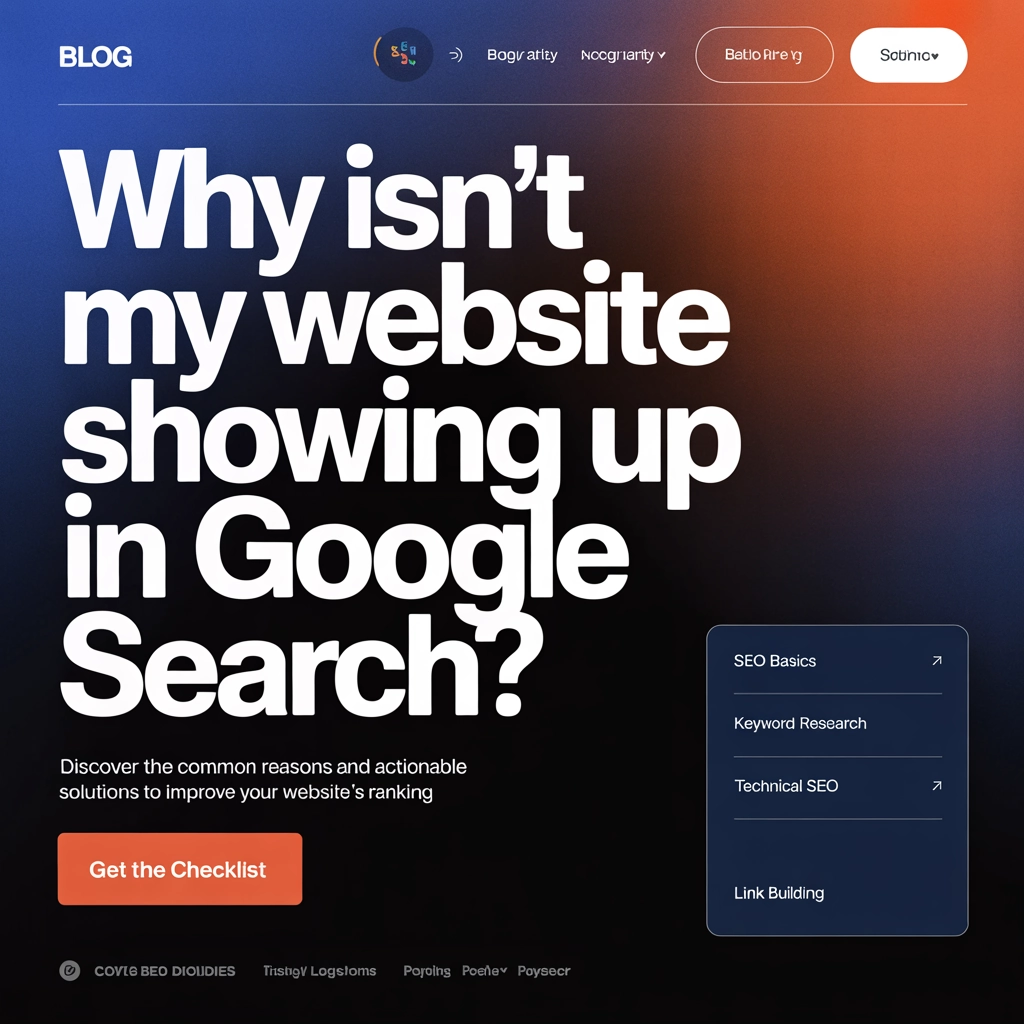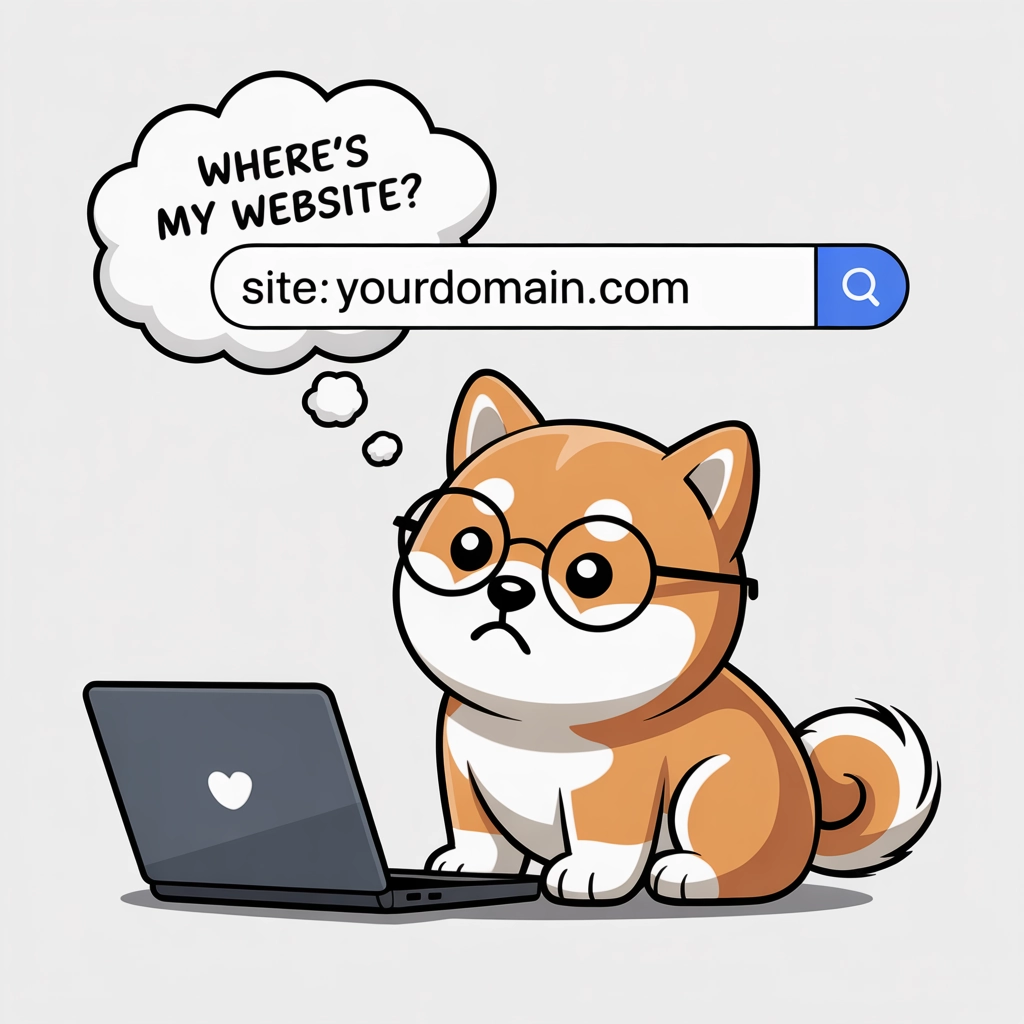Why Isn't My Website Showing Up in Google Search?
Learn why your website might not be appearing in Google search results and get a step-by-step troubleshooting guide to fix the most common issues.

 🐾
🐾Why Isn't My Website Showing Up in Google Search?

You've built a beautiful website, filled it with amazing content, and launched it with excitement... but when you search for it on Google, crickets. Nothing. Nada. It's like your digital storefront is hidden down a back alley that no one visits.
If you're asking "Why isn't my website showing up in Google search?" you're not alone. This is one of the most common frustrations for small business owners and a question we hear daily.
The good news? Most search visibility issues have straightforward solutions once you understand what's happening behind the scenes. Let's dig into why Google might be giving your website the cold shoulder and how to fix it.
How Google Actually Finds Your Website
Before diving into troubleshooting, it helps to understand how Google discovers websites in the first place:
- Crawling: Google sends out "spiders" (automated bots) that follow links across the internet
- Indexing: If the spiders can access your content, Google stores information about your pages in its index
- Ranking: Only after your site is indexed can it appear in search results, ranked according to relevance and quality
If your website isn't showing up, something's gone wrong in one of these steps. Let's investigate the most likely culprits.
The "Is It Plugged In?" Test for Google Search
First, let's check if Google knows your website exists at all with this simple test:
- Go to Google
- Type
site:yourdomain.com(replace "yourdomain.com" with your actual domain) - Check the results
If nothing appears, Google hasn't indexed your site. If some pages appear but not others, you have partial indexing issues.

Major Reasons Your Website Isn't Showing Up in Google
1. Your Website Is Too New
The Issue: Google doesn't immediately index new websites. If your site launched within the last few weeks, you might simply need patience.
The Fix:
- Submit your website to Google through Google Search Console (we'll cover this in detail below)
- Wait 1-4 weeks for Google's initial crawl
- Focus on building content and gathering initial backlinks while you wait
2. Technical Barriers Are Blocking Google
The Issue: Your site might have technical configurations that explicitly tell Google "do not index this site."
Common Culprits:
- Robots.txt blocking: A file that says "keep out" to search engines
- Noindex tags: HTML code that tells Google not to include specific pages
- "Discourage search engines" setting: A WordPress option that's often accidentally left on after development
The Fix: Check for these technical barriers:
<!-- Check if this appears in your page's HTML code -->
<meta name="robots" content="noindex">
Or in your robots.txt file:
User-agent: *
Disallow: /
If you find these, remove them or modify them to allow Google access.
3. Google Search Console Isn't Set Up
The Issue: Without Google Search Console, you're flying blind and missing the tools to communicate directly with Google.
The Fix: Set up Google Search Console by:
- Creating a free account at search.google.com/search-console
- Verifying ownership of your website
- Submitting your sitemap (usually found at yourdomain.com/sitemap.xml)
- Requesting indexing for your important pages

4. Your Site Has Critical Technical Problems
The Issue: Technical issues can prevent Google from properly crawling your site.
Common Problems:
- Server errors (5xx status codes)
- Painfully slow loading times
- Security issues or malware
- Mobile usability problems
- Complex JavaScript that Googlebot struggles to render
The Fix: Use Google Search Console to identify these issues under "Coverage" and "Mobile Usability" reports. Then work with your developer to resolve them.
Non-Technical Factors Affecting Your Search Visibility
Even if Google has indexed your site, several factors might still keep it from appearing in search results:
1. Your Website Lacks Authority
Google prioritizes websites with established credibility. New sites with zero backlinks (other websites linking to yours) struggle to rank, regardless of content quality.
Quick Authority Boosters:
- Create and share your content on social media platforms
- List your business on relevant directories (Google Business Profile, Yelp, industry-specific directories)
- Reach out to industry blogs for guest posting opportunities
- Create YouTube videos that link back to your website (Google owns YouTube and these links can index quickly)
2. Your Content Doesn't Match Search Intent
The Issue: Your website might be optimized for keywords no one is searching for, or the content doesn't satisfy what searchers actually want.
The Fix:
- Research keywords with tools like Google Keyword Planner or Ubersuggest
- Analyze top-ranking competitors to understand what content succeeds
- Create content that directly answers common questions in your industry
- Include target keywords naturally in titles, headings, and throughout content
3. You're in a Highly Competitive Niche
The Issue: Some industries are extremely competitive in search. A new local coffee shop will struggle to rank for "best coffee" against established giants.
The Fix:
- Target long-tail keywords (more specific phrases with less competition)
- Focus on local SEO if you're a local business
- Create niche content that larger competitors haven't covered
- Be patient and consistent—building search visibility in competitive industries takes time

The Step-by-Step Troubleshooting Checklist
Follow this systematic approach to diagnose and fix your search visibility issues:
Step 1: Verify Indexing Status
✓ Perform the site:yourdomain.com search test
✓ Check Google Search Console's "Coverage" report
✓ Use the "URL Inspection" tool for specific pages
Step 2: Fix Critical Technical Issues
✓ Remove any noindex tags or robots.txt restrictions
✓ Fix server errors (check hosting provider)
✓ Ensure your site loads in under 3 seconds
✓ Make your site mobile-friendly
✓ Create and submit a sitemap
Step 3: Build Initial Visibility Signals
✓ Create a Google Business Profile
✓ Share your website on social media
✓ Get listed in relevant directories
✓ Ask friends, family, and loyal customers to visit your site
Step 4: Optimize Content for Search
✓ Include target keywords in page titles, headings, and content
✓ Create unique, valuable content (avoid duplicating from other sites)
✓ Add alt text to images
✓ Improve meta descriptions to encourage clicks
Step 5: Monitor and Improve
✓ Check Google Search Console weekly
✓ Address any new errors promptly
✓ Track ranking improvements for target keywords
✓ Continue building quality backlinks
When to Expect Results
Be realistic about timeframes:
- Technical fixes: Results within 1-4 weeks
- New content indexing: 3-7 days after submission
- Ranking improvements: 3-6 months for significant movement
- New websites: 6-12 months to build substantial search visibility
Common Questions About Google Search Visibility
Q: Do I need to pay Google to show up in search results?
A: Absolutely not! Organic (non-paid) search results are free. While Google does offer paid ads, they're separate from organic listings and clearly marked as "Sponsored."
Q: How often does Google check my website?
A: It varies. Popular sites might be crawled daily, while new or less-visited sites might only be crawled every few weeks. As your site gains authority, crawl frequency increases.
Q: Will changing my website design affect my Google rankings?
A: Minor design changes shouldn't impact rankings if the content and URLs remain the same. However, major redesigns that change URL structures or remove content can significantly affect rankings if not properly managed with redirects.
Q: I made changes to my site. How long until Google notices?
A: Without direct submission, it could take weeks. Speed up the process by submitting changed URLs through Google Search Console's URL Inspection tool.
When to Consider Professional Help
While many search visibility issues can be solved on your own, consider reaching out to an SEO professional if:
- You've followed all the steps above and still see no improvement after 3 months
- Your site has been penalized by Google (you'll see a message in Search Console)
- You're in an extremely competitive industry and need advanced strategies
- You don't have time to manage ongoing SEO tasks
The Path Forward
Remember that search visibility is a marathon, not a sprint. Even the biggest websites started with zero visitors. What matters is taking consistent action to improve your site's technical health, content quality, and authority.
Start with the technical fixes outlined above, then focus on creating content that genuinely helps your target audience. Google's ultimate goal is to show the most helpful, relevant content to searchers—align your efforts with that goal, and visibility will follow.
For small business owners, the journey to search visibility can feel frustrating, but the rewards of organic traffic are worth the effort. Unlike paid advertising that stops working the moment you stop paying, SEO investments continue delivering returns for months and years to come.
So don't get discouraged if your website isn't showing up in Google search just yet. Follow the steps in this guide, be patient with the process, and keep creating valuable content for your audience. Your persistence will pay off.
 🐾
🐾